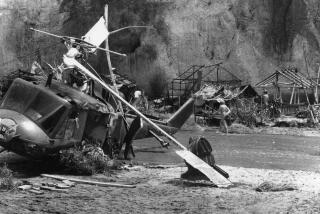19 Survivors of Cerritos Air Crash Still Await Damages : Courts: Delay in producing a trial transcript and an FAA appeal leave them stuck in a legal morass.
- Share via
Caught in a bureaucratic nightmare, 19 people who have been awarded damages for losses they suffered in the Aug. 31, 1986, Cerritos air crash have yet to be compensated by the U.S. government.
The hang-up: a court reporter, beset by personal problems and professional workload, who has not yet produced a key transcript.
The transcript is of a 1989 civil trial in which a judge ruled that the Federal Aviation Administration and the pilot of a small plane were equally responsible for the Labor Day weekend crash, which resulted in 82 deaths of passengers and residents in the homes hit by the flaming wreckage.
The 1989 ruling paved the way for trials in which several families were awarded millions of dollars in damages for their losses.
The FAA, held to be partly liable for the crash because of air traffic controller culpability, is appealing that decision. Department of Justice attorney Steven J. Riegel, representing the government in the case, says the government has done everything possible to expedite getting the transcripts. He denies claims that the government is intentionally moving slowly.
But lawyers for the survivors say government attorneys have dragged their feet in an attempt to force survivors to settle for less than they would get in a trial or to give up part of what they have already won in order to get money more quickly.
“They are using the delay as a club,” said attorney Joseph T. Cook of Irvine. “These people are innocent victims. They didn’t ask that airplane to hit their house. They are suffering from an extraordinary circumstance that we have little control over and not much mechanism to overcome.”
He was speaking about people such as Theresa Estrada and her sons, Alex and Frank Jr., who were awarded $2.8 million in damages in December, 1990. The family has not received a dime of the money and there is no prospect that they will any time soon. Mrs. Estrada’s husband, Frank, and two of her children were killed in a fire after part of the jetliner crashed in the back yard of their Cerritos home.
Cook, who has worked on many major air crash cases during the past 20 years, said he had encountered many unusual situations as an attorney but never one quite like this. “I’ve never even heard a lawyer tell a war story like this in a bar,” he said disgustedly.
Attorneys for several of the families ensnared in the tangle said their clients were experiencing financial hardships but declined to go into detail to avoid embarrassing their clients.
The legal nightmare of the Estradas and several other families is rooted in events of April 14, 1989, when the first phase of the Cerritos litigation ended.
After a 52-day trial, U.S. District Judge David V. Kenyon ruled that the FAA and William K. Kramer, the pilot of a small plane that collided with an Aeromexico DC-9, were equally responsible for the crash, which killed 67 passengers and crew members and 15 people on the ground.
The judge also ruled that Aeromexico bore no responsibility for the tragedy. He issued a strong rebuke to the FAA, saying controllers were negligent for failing to advise the DC-9 that Kramer’s plane posed a danger to the jetliner.
The Justice Department contends that Aeromexico bears some of the responsibility for the crash and in September, 1989, the department asked the U.S. 9th Circuit Court of Appeals for an expedited appeal. The request was granted on Feb. 20, 1990.
Meanwhile, individual trials to determine how much damages survivors were entitled to began.
Because of crowded court calendars, 28 damage cases are still pending. The Justice Department has paid out $25 million to 44 families that agreed to settlement offers.
Seven families went to trial and were granted millions of dollars by judges.
But the Justice Department has said it will not pay out damages awarded by judges until the completion of its appeal on the liability phase of the case.
The lack of a transcript, in essence, has blocked the appeal from moving forward and delayed damage payments to survivors.
The transcript needed in the appeal originally was due Dec. 30, 1990. Riegel said he learned on Nov. 30, 1990, that the transcript would not be completed on schedule.
Court reporter Julie A. Churchill told Riegel that she could not finish the transcript until March 30, 1991, according to court documents. But she was unable to meet that commitment and the transcript is still nowhere near completion, according to court documents and interviews.
Churchill has sent at least two letters to officials at the U.S. 9th Circuit Court of Appeals in San Francisco, including one on June 13, explaining her difficulties in finishing the transcript.
She noted that she had had a car accident, been treated for “physical exhaustion” and been directed to finish the transcripts on two major criminal cases and some minor criminal cases, which took precedence.
Last July 11, 9th Circuit officials issued an order saying that if Churchill failed to complete the transcript “in a timely fashion” she would be subject to sanctions.
On Aug. 14, Aeromexico’s attorney, Frank A. Silane, asked the 9th Circuit to dismiss the Justice Department’s appeal on the grounds that it had failed to prosecute the case, based on the government’s failure to obtain a trial transcript.
The government opposed the motion, contending that it had acted diligently.
On Oct. 1, the appeals court rejected the dismissal motion, directed the government to immediately inform it if the transcript was completed and ordered the Justice Department to file its appeal brief Nov. 6.
A month later, on Nov. 4, the Justice Department informed court officials that it had received a transcript of only 20 of the 52 days of trial. Justice asked for another extension to file its brief.
This week, Cathy A. Catterson, chief clerk of 9th Circuit, said she was not sure how much of the transcript has been completed.
She said court officials planned to send a letter to the Justice Department asking for clarification of precisely which days of the trial have been transcribed.
Asked why the work was not given to another court reporter, Catterson said that only in rare circumstances had court officials used a new reporter to transcribe the notes of the original reporter and she did not indicate that anyone was contemplating doing that in this case.
Other court officials declined comment or did not return phone calls.
Churchill also declined to return numerous calls. Her lawyer, Marilyn Bednarski, said: “My understanding is that Julie is working on those transcripts and getting them completed. She’s doing everything she can do.” Bednarski was unable to say when Churchill expected to finish the transcript.
On Jan. 3, Aeromexico’s lawyer Silane, in an attempt to expedite the appeal, sent a letter to Riegel suggesting that they assemble a trial transcript from a combination of Churchill’s final versions, unofficial daily transcripts done during the trial and rough drafts from other days of the trial that all could agree on. He said he has yet to receive a response to his letter.
James J. McCarthy, a Century City lawyer who represented four families of people who died in the crash and won major damage awards, and Thomas Kallay, a Los Angeles lawyer handling the plaintiffs’ appeals, called the situation unprecedented.
“Julie Churchill was a very cooperative, competent reporter during the trial,” said McCarthy. “I don’t want it to appear I’m blaming her personally. . . . I don’t want to see Julie Churchill in trouble, but my God, someone has to do something about this transcript.”
He added, “She works for the government. It’s the government that isn’t doing the job here. As a consequence, my clients are suffering. I blame the government, the system, the 9th Circuit in part. Nobody seems to give a damn.”
Both Cook and McCarthy also said they considered this situation outrageous because under federal law, the U.S. government may not have to pay the plaintiffs any interest until after the appeals are decided. In most civil cases, interest payments start accruing from the date the initial judgments are rendered.
One of McCarthy’s clients, Marcy Huerta, said she is quite angry about the fact that she and her two sons and daughter have not received the more than $691,000 in damages that U.S. District Judge Manuel L. Real determined they were entitled to. Huerta’s husband, Gregorio Huerta, who was returning from a fishing trip to Loreto, Mexico, was one of the 67 people on the DC-9 who perished in the crash.
She moved to Santa Barbara three years ago and took a job as a receptionist in a small firm. Her son, John, and his family live in her house in Norwalk.
“I’d like to get this over with,” she said in a telephone interview. “We’ve waited so long. The fact is that the government is partly to blame and now they’re fighting it.”
More to Read
Sign up for Essential California
The most important California stories and recommendations in your inbox every morning.
You may occasionally receive promotional content from the Los Angeles Times.










